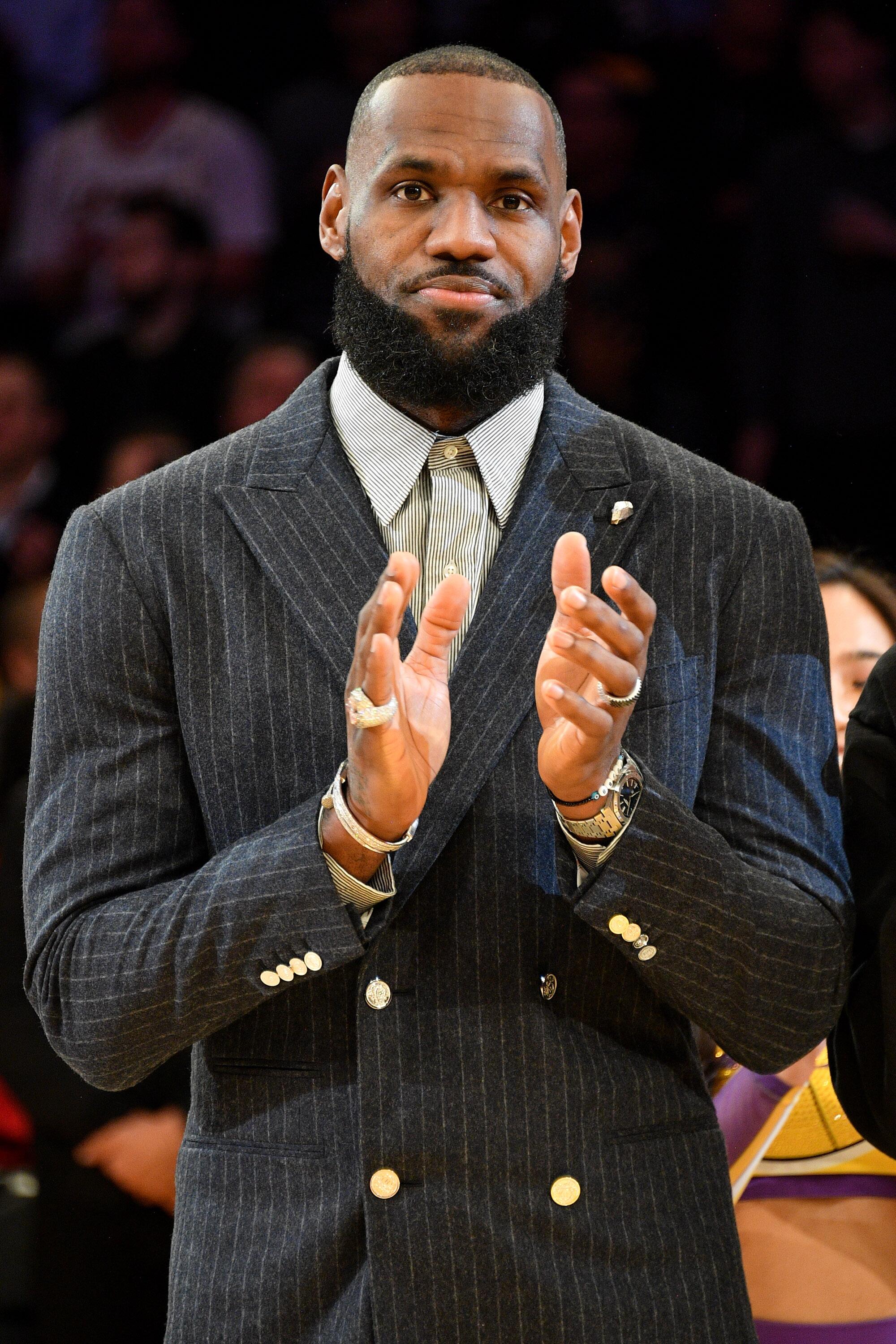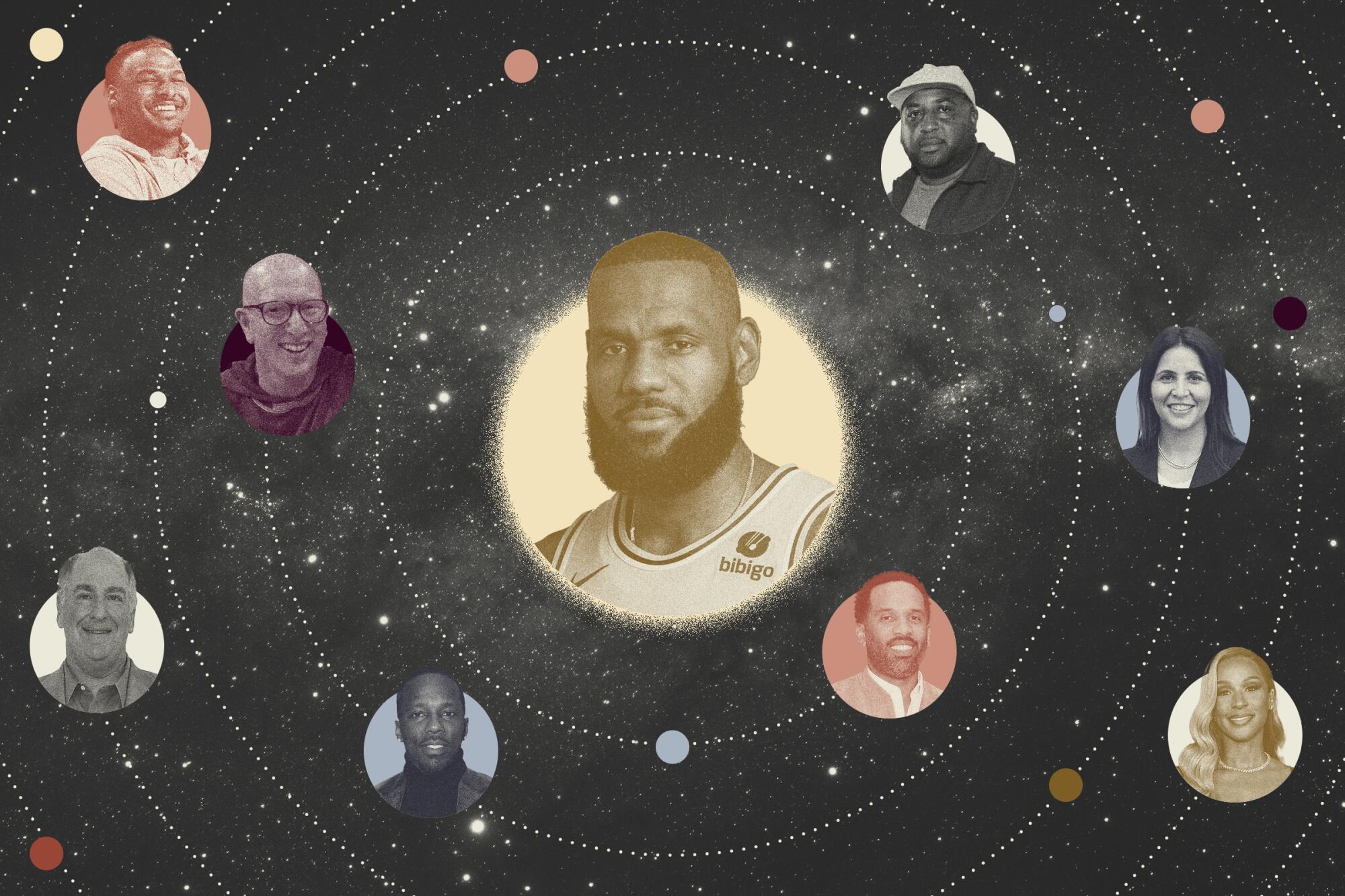
Back in November, a few days after Thanksgiving, LeBron James had left Los Angeles for a visit to his hometown of Akron, Ohio, in part to show a group of reporters around his childhood home.
Well, a replica of his childhood home.
“Go ahead,” he said, nodding toward a green door, an exhibit at the new LeBron James Home Court museum made to look like the entrance to Apartment 602. “Look around.”
Inside, the walls were covered in taped-up posters, 1990s teenager style. There was Shaquille O’Neal rushing toward the basket. Earvin “Magic” Johnson angling for a layup. Kobe Bryant floating in for a dunk.
Discover the changemakers who are shaping every cultural corner of Los Angeles. L.A. Influential brings you the moguls, politicians, artists and others telling the story of a city constantly in flux.
In many ways, these men — these legendary Lakers who long ago hung up the purple and gold — remain more synonymous with Los Angeles than James, who still wears the uniform. But if this bothers the 39-year-old, who is playing some of the best basketball of his 21-year career, it doesn’t show much.
Indeed, while fans and pundits have been busying themselves with speculation about the depths of his team loyalty and his future, James has been busy building an economic empire tying himself more fully to Los Angeles. And unlike in Ohio, where he’s mostly known as a one-man savior of civic life, opening not just a museum, but a transformative school, a housing complex and a community center, what he’s doing in Southern California is a team effort.
Think of it as a collective. Or maybe a solar system.
In the middle of LeBron Inc. there’s James — the global star and the center of gravity. And then there are his brothers from different mothers, the three men most associated with James, who’ve spent decades shining in his orbit, always aligned in one way or another.
There’s Rich Paul, who founded the powerful Beverly Hills-based talent agency Klutch Sports Group and hired James as his first client not long after they met by chance in an airport in 2001 and struck up a conversation about a vintage football jersey.
Maverick Carter, who met James when they were both in grade school, was the first to move to L.A. and is chief executive of the TV and film studio they co-founded, the SpringHill Co.
And Randy Mims, who also has been friends with James since they were kids and today is his chief of staff.
Mentioned less often, but also very much in the mix are Fara Leff, the chief operating officer of Klutch Sports Group, and Adam Mendelsohn, James’ media advisor, and Paul Wachter, founder and chief executive of Main Street Advisors.

Even James’ son, Bronny James, is a star in his own right, declaring for the NBA draft after a year playing basketball at USC, while his wife, Savannah James, is an entrepreneur and investor who has started building a very-L.A. empire of her own.
The influence of James and his collective on Los Angeles — particularly the parts of it that revolve around media and entertainment — is palpable.
Klutch, for example, is one of the top agencies in the world, growing from just four clients in 2012 to more than 400 today, including the NBA’s Anthony Davis and Trae Young, and the NFL’s Jalen Hurts and Odell Beckham Jr. In 2019, Klutch agreed to a pivotal partnership with United Talent Agency that has given its clients even more avenues into Hollywood, including in film, television and podcasting.
Leff, who was around in the early days of Klutch, said she and Paul wanted to “break the mold of what the typical agent-to-player relationship was. You know, you signed a contract and then you see them at your next contract. Ours was how do we grow young men, professional athletes, professional businessmen, fathers and sons.”
These are themes that Paul echoed in his memoir, “Lucky Me,” with a foreword written by James.
“Rich helped me find my strength in that chaos, a chaos that he knew all too well. Rich never asked me for anything. He didn’t care whether I was a future pro or the kid across the street. He just knew I needed his help, and he gave me what I needed most — the space to be vulnerable,” James wrote.
Meanwhile, the SpringHill Co. — named after the building in Akron that housed James’ real Apartment 602 — has released a long list of acclaimed shows, movies and documentaries, including “What’s My Name: Muhammad Ali,” HBO’s “The Shop,” “Self Made: Inspired by the Life of Madam C.J. Walker” and, of course, “Space Jam: A New Legacy.”
Sports is no longer just sports. It’s culture, it’s business, it’s music and more — all ripe for investment.
In addition, the company over the years has brought in new investors, including RedBird Capital, Nike, Fenway Sports Group and Epic Games, to fund an international expansion. And it has inked deals with Netflix, ABC Studios and Universal Studios, further solidifying a place in the Hollywood firmament.
What’s often forgotten is that James and Carter, in many ways, pioneered the idea of a working professional athlete becoming part of the media ecosystem. Not just being covered by journalists and subject to outside narratives, but running a media company and creating a narrative of one’s own.
This has become common. Think Kevin Durant’s Thirty Five Ventures or Naomi Osaka’s Hana Kuma. And that’s because sports is no longer just sports. It’s culture, it’s business, it’s music and more — all ripe for investment.
“The world has changed a lot in the last 20 years,” said Wachter, who has long managed James’ investments, from Cannondale bikes to Lobos 1707 tequila to Beats by Dre. “Now athletes are much more tuned into business, but that was just very unusual.”
In fact, Wachter uses the word “unusual” a lot when he talks about how James, Carter, Paul and Mims became so powerful. He was one of their first contacts in Los Angeles in 2005, when the LeBron Inc. collective was still based in Akron and nearby Cleveland, where James played for the Cavaliers.
“They were kids. I was not a kid,” Wachter said. “I was just amazed that they had, at that age, taken the trouble — and it wasn’t their mom or their dad or their sister, their cousin — to find someone who clearly wasn’t from their world and ... to do research to say, who might be good for us.”
They hired him. And Wachter and his then-teenage daughter took LeBron and Savannah James house hunting.
“And here we are almost 20 years later,” Wachter said. “He came here and he’s made his home here.”
Or homes. James and his family are building their dream home from the ground up on what had been the site of their $37-million mansion in Beverly Hills.
“He chose to be here. He didn’t get traded,” Wachter said. “You basically took what was basically a Cleveland operation. Now, it’s an L.A. operation.”

